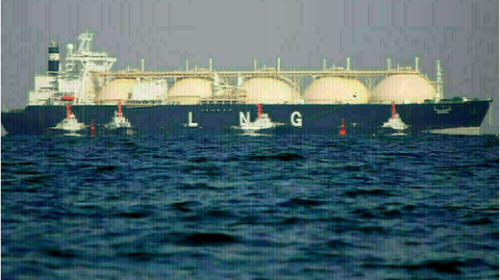SINGAPORE: Traders diverted at least six cargoes of liquefied natural gas that were on course for Asia to Europe earlier this month, drawn by higher European prices and amid weak Asian demand, according to analysts and shipping data.
The diverted cargoes could help meet additional European demand as countries seek to replace piped Russian gas after the Ukraine transit deal expired on Jan. 1, while weather forecasts point to lower temperatures in northwest Europe.
The vessels had loaded in the US and were initially destined for China, South Korea, Thailand and Singapore, data from analytics firm Kpler showed. The vessels were then diverted in the Atlantic Ocean between Jan. 8 and Jan. 14, changing course for Europe.
“The diversions are happening because Asian prices aren’t keeping enough of a premium to European prices to attract cargoes,” said Martin Senior, head of LNG pricing at Argus, adding that nearly all Atlantic basin cargoes are heading towards Europe.
Asian spot LNG has slipped for two consecutive weeks, as ample inventory levels in east Asia and spot prices trading at around $14 per million British thermal units (mmBtu), seen as too high for some buyers, curb demand. Prices have eased nearly 5% since the start of the year to $13.90/mmBtu on Friday.
The benchmark front-month contract at the Dutch TTF hub closed at 47.40 euros per megawatt hour on Friday, or $14.27 per mmBtu. The Bushu Maru and Flex Vigilant vessels, which both loaded at Freeport LNG, diverted to Europe on Jan. 8 and Jan. 13, respectively.
The Flex Vigilant was initially headed to Thailand. Grace Dahlia, chartered by Glencore, loaded at Calcasieu Pass and was first China-bound but diverted for Turkey on Jan. 8.
After loading at Cameron LNG, Mitsubishi-controlled Diamond Gas Crystal diverted its route on Jan. 13, changing its destination from South Korea to Europe. LSEG data shows it is heading to Rotterdam in the Netherlands.
Global LNG: Asia spot prices gain amid Russia-Ukraine gas transit concerns
Meanwhile, tankers Maran Gas Sparta and Gaslog Georgetown diverted on Jan. 10 and Jan. 14, respectively, after loading at Sabine Pass. Glencore-controlled Maran Gas Sparta was heading to Singapore before pivoting to the Netherlands, while Gaslog Georgetown chartered by Cheniere Energy was previously going to China.
“We’ve seen more of China re-selling recently, they are reselling to Europe or within Asia and it is the second-tier players doing it because they don’t have much storage capacity,” said Kpler analyst Go Katayama.
High LNG prices and weak domestic demand deterred the buyers from taking more supply while domestic gas production and pipeline supply from Russia has risen year-on-year, he added.





